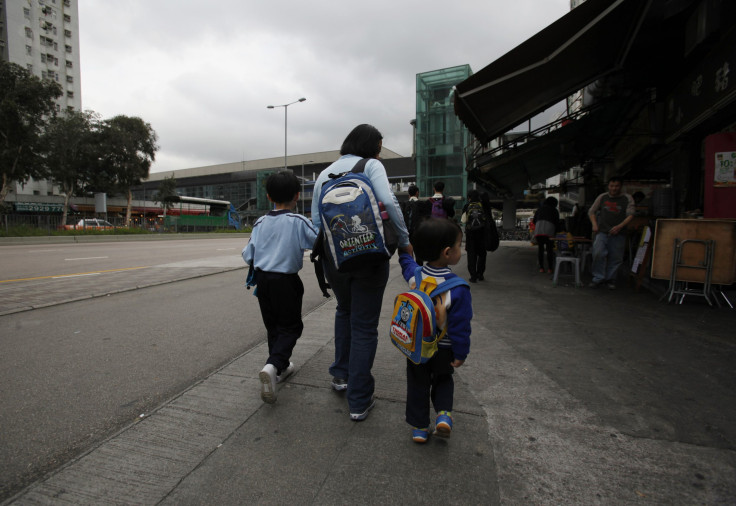For Hong Kong Expatriates, Convenience Of Cheap Domestic Help Is A Comfort Trap

HONG KONG -- Stroll through the air-conditioned elevated walkways that connect the downtown skyscrapers in this bustling financial hub on any given Sunday, and you'll see a very different picture of the city than you do on any other day of the week. The executives and expats rushing from meeting to meeting are replaced with thousands of women, sitting on makeshift cardboard mats, eating, chatting and laughing together. Such are their numbers that they dominate many of the public spaces in one of the most expensive real estate environments in the world, one day a week.
These are Hong Kong's domestic helpers and Sunday is their day off. There are around 300,000 of them in the city, mainly from the Philippines and Indonesia, and with a minimum wage of HK$3,920 per month ($505), they are widely employed by both locals and expatriates alike. The law requires them to live with their employer -- indeed, so many families employ domestic helpers that a large proportion of apartments come ready-built with bedrooms for “the help.”
For many expats, the notion of having live-in help is something that they would only have experienced through watching “Downton Abbey.” But as many find after coming here, the lure of affordable child care and domestic help can be hard to give up.
“It makes things so much easier in so many different ways,” said Joanne, a Canadian of Chinese heritage, who is a bank executive in the city and has been in Hong Kong for four years, and has a two-year-old daughter. She asked that IBTimes not use her last name, or identify the company she works for.
“It allowed us to get our life 'back to normal' faster. When I compare our lifestyle with our friends back home who've had children around the same time, my husband and I definitely have a much easier time re-integrating back into adult life. We can go to dinners and parties and see our friends, obviously not to the same extent we were before, but much more often than friends back in Canada who don't have the luxury of having extra help,” she added.
A common theme that emerged in IBTimes' discussions with a number of Hong Kong expatriates who employed domestic helpers was that having domestic help was of particular significance at a time when they had young families.

In the some of the more expensive cities in the U.S., the average annual cost of full-time daycare for a baby can be enormous. According to the Washington Post, full-time daycare in New York costs about $14,500 per year, roughly $16,500 in Massachusetts, $11,628 in California and $12,500 in Illinois. The U.S. costs are a sharp contrast to the roughly $6,000 yearly cost of employing a domestic helper six days a week in Hong Kong.
That $6,000 annual salary, meagre as it is by Western standards, is what draws women from across southeast Asia to work as helpers in Hong Kong. Two helpers IBTimes spoke to said that they were supporting two generations of their respective families in their home countries of Sri Lanka and the Philippines. Another said that she was the primary breadwinner for her family, and that her husband had only intermittent work.
“[Having a domestic helper] is certainly a big convenience,” said Kenneth Lim, a Chinese American from New York, who has been in Hong Kong for over 8 years. “I think anyone who has a domestic helper who has kids would probably say the same thing.”
“I have come to depend quite a bit on my helper. Having my meals, clothes, and home taken care of reduces the stress in my family. It would definitely be a factor in my decision to move,” internet user threelittlepigs said on a Hong Kong expatriate forum, in response to questions from IBTimes. “But as the kids get older, then the need for a helper is reduced, thus having a helpers plays a much smaller role in the decision to move,” he added.
What became clear in IBTimes discussions with expatriates was that outside of the period in their family lives when they had young children, other push and pull factors would have more sway over their decisions on whether to stay or return home. These included the low taxes and high incomes in Hong Kong on the pull side, and environmental pollution and the high cost of education of the push side.
For some expatriates, however, having crossed the Rubicon into the world of domestic help, it is hard to leave. “We tried to get re-posted in Hong Kong because of the fact that our helper is so great,” Joanne said. “It would be very difficult at this point in our lives to go back to a country where we would not be able to get affordable domestic help,” she added.
© Copyright IBTimes 2024. All rights reserved.












